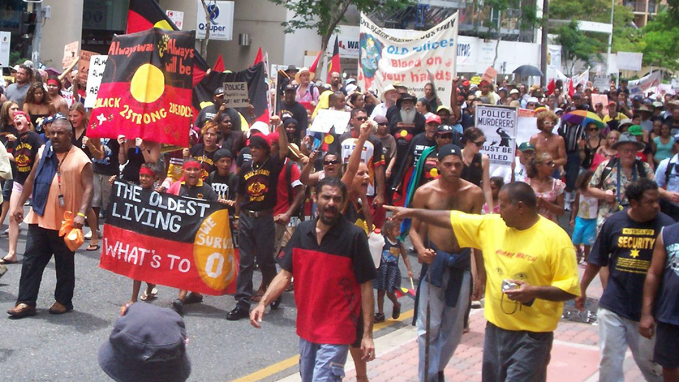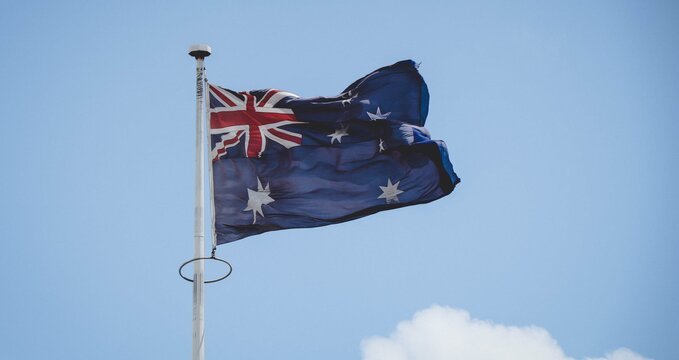When celebrating a country becomes a problem, Part 1: Australia Day and the Indigenous Peoples

Image credit: David Jackmanson
With different ethnic groups often cohabiting within a single state, finding the best way to celebrate a country can become a problem, especially when national days carry historical baggage.
National days are important because they represent the celebration of a country as a single entity, with all the citizens coming together to appreciate what they have. According to the country, these gatherings can hold different meanings and be more or less popular or democratic. But in multi-ethnic Western democracies, are national celebrations a problem?
This question should be internationally addressed, especially in former colonies or countries that have lived through a difficult past of invasions and violence, or in countries that have a history of colonialism, often brutal. Australia is one such country, whose national day routinely causes controversy.
Australia Day is celebrated every year on 26 January. But here’s the rub: the date itself is a problem. You probably wonder what’s wrong with this special day? And to understand the problem, a little bit of historical context is necessary.
What is Australia Day? A bit of history
As you probably know, Australia is a former British colony, still a Commonwealth country today, where Queen Elizabeth II is the Head of State. In fact, even though Australia became a confederation in 1901, Australian nationality and citizenship have only existed since 1948, with the Nationality and Citizenship Act. Before that, inhabitants of Australia were simply British citizens. However, the indigenous people of Australia only got their Australian citizenship in 1967. At this time, Australia Day wasn’t officially the national day of the country, even if it already existed. But why the 26th of January?
On 26 January 1788, the First Fleet of eleven ships led by Captain Arthur Philip arrived at Sydney Cove. Here, the new colony was settled with convicts from Great Britain, who were sent to the new continent. Before that in 1770, British Captain James Cook raised the Union Jack on what is today called Possession Island on the eastern part of the continent.
Thus, 26 January is a colonial date. It first became a public holiday in New South Wales. In 1888, other states’ leaders from Tasmania, Victoria, Queensland, Western Australia and South Australia (and also New Zealand) met in Sydney to celebrate the centenary of the colonies. It became an Australian anniversary.

At the end of the 19th Century, the 26th of January was celebrated under the name of Anniversary or Foundation Day. Then, Australian colonies federated into the Commonwealth of Australia in 1901, and the date’s importance in national life was set. But as soon as 1938, voices started to speak up against the celebration of this specific day and its meaning for a huge part of the people living on the continent.
When the British arrived in Australia, they proclaimed the land “Terra Nullius” (a land that belonged to no one), yet it had been inhabited for millennia: the Aborigines and Torres Strait Islanders, had lived there for more than 60,000 years already. The British didn’t acknowledge them. In 1938, these people declared that the 26th of January wasn’t a day of celebration for them. Aboriginal leaders protested against this so-called national day, organising a Day of Mourning on the same day instead. They used this protest to ask for more recognition and citizens’ rights, and to denounce the mistreatment they had suffered under white Australian rule.
Aborigines later named the day Invasion Day and continued to organise their own commemorations on the same date, also calling it Survival Day to show their point of view in history. Despite this, and following the large celebrations held for the bicentenary of Australia in 1988, Australia Day was officially established as the national day in 1994. This was decided by then Prime Minister Bob Hawke, who did believe in reconciliation but didn’t realise that such a celebration excluded and alienated Indigenous Australians, who had their own history, tens of thousands of years long, in this land.
- The story of the women’s suffrage movement in the UK and Ireland: how has feminism evolved?
- Sinn Féin, Fianna Fáil, and Fine Gael: how independence split a unified movement in three
What does it mean to Aborigines and Torres Strait Islanders?
Indigenous people calling the 26th of January “Invasion Day”, “Mourning Day” or “Survival Day” says a lot about their thinking on the subject. Because while the British convicts, who arrived in Australia on this date, saw it as new beginning and an escape from prison life; their arrival meant destruction and violence for the people who were already living on the continent and who saw their land taken away from them by a civilisation they didn’t know or want to be a part of.
Each year, marches in various cities are organised on Australia Day to commemorate it as Invasion Day and show to the world that the 26th of January isn’t a peaceful and happy day for every inhabitant of Australia. The crowds are usually huge and even this year, with Covid, activists got together, braving the restriction, to keep the protest alive.
On 21 January 2016, the YouTube channel As/Is posted a video entitled “Aboriginal People Respond To ‘Australia Day’”, in which Aborigines tell us what comes to mind when they think about Australia Day. Their answers mean a lot.
“Don’t you mean Invasion Day?” a man reacts, while another explains that “it holds different meaning to different people, for [them] it means survival”. The hurt is very present in their answers: “The fact that they are celebrating the day we lost all that we had, it’s pissing me off” another man said. And the younger generations also carry this feeling of suffering. One boy has very strong words for the celebration: “It’s really sad [to see] people celebrating the day your people got slaughtered and invaded, the day that caused all that destruction and all that suffering to very peaceful people.”
The first answer of one of the women in the video was simply “racism”. Another woman called it “insensitive, to say the least”. “It’s an offense,” another man adds. “It’s the day that marked the beginning of the massacres.” That’s why, for Aborigines, Australia Day shouldn’t have this name, but some of them must see a certain meaning in calling it Survival Day: “It’s the celebration of the survival of one of the oldest culture, if not the oldest culture, on Earth,” another interviewee mentions. The same man who calls the day an offense notices that another date of celebration makes more sense: 1 January, when in 1901, Australia became a unified federation for the first time.
What should be done?
The question is political. In an article on the New York Times, Lidia Thorpe, the first Aboriginal senator elected in the state of Victoria, said that “there is an uprising” among the indigenous people of the whole continent. In the same article, Marcia Langton, an anthropologist and professor of Indigenous Studies at the University of Melbourne declares that the 26th of January “is not a national day anymore” but a “day for division”. Non-aboriginal Australians also take part in marches and protests against Australia Day, acknowledging that this date is disrespectful for the first inhabitants of their land.
One solution seems simple: change the date. However, it’s not easy to change a national day because it is first a symbol, then a celebration, and even if it’s not officially a very old one, it still has a long history. Some people ask for the national day to be set on 1 January to commemorate federation. Others suggest 9 May, the day on which the first Parliament of Australia opened.
On their website, the organisation Common Ground, which is led by Aborigines, shares stories of the First Nations of Australia. They work for a better education on their history and talk about the movement Change the Date. Of the various possible dates, “May 8th”, because it sounds like “mate” (Australian slang for “friend”), stands out; and also 27 May as the anniversary of the 1967 Indigenous referendum. “The purpose of changing the date is to recognise that many people value having a special day to celebrate the place they call home, while also acknowledging the traumatic context and history that 26 January in particular represents”.

Unfortunately, not everybody agrees. A video on Behind the News YouTube channel (a part of the Australian Broadcasting Corporation) shows that some defenders of the date argue that the meaning is not the same anymore and that Australia Day is now about celebrating the country as a whole, with all its differences. A boy interviewed at the end of the video even explains: “For years, it’s been an Australian tradition to have Australia Day on this day, and I think if we move it then it might lose a little bit of its charm that it’s had”.
As it has been showed by an Ipsos poll published on the Sydney Morning Herald’s website: “only 28 percent of 1222 people surveyed nationally were in favour of shifting the date, while 48 per cent were opposed and a further quarter neither agreed or disagreed”. Even the current Prime Minister of Australia, Scott Morrison, defended the date by speaking against the people who would like to “cancel” it.
When history is taken into account, celebrating a country can become a problem. The case of Australia is interesting and hotly debated because of what it represents for Indigenous people. Moreover, since Australia calls itself a multicultural democracy, does it truly make sense to celebrate the country with a date that only means something for a small part of the population (Anglo-Celtic Australians)? The debate lies here, but in Dublin, the Australian embassy has already chosen to promote representation by flying the Aboriginal flag permanently. What do you think about it? Let us know your opinion on the topic in the comment section!
Read the second part here: When celebrating a country becomes a problem, Part 2: the 4th of July and Black Lives Matter